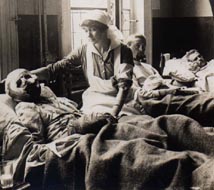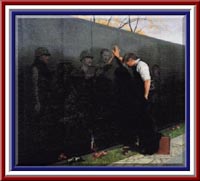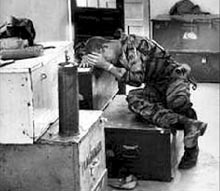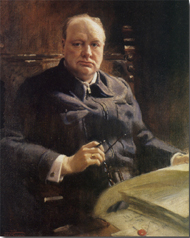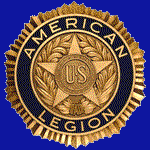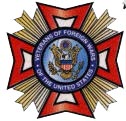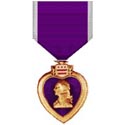

| Tuesday |
|
This World War One veteran suffered from "Shell Shock"
No matter what you call it, exposure to war creates physiological changes in the brain that never go back to the pre-war state. Today we call this condition Post Traumatic Stress Disorder.
Ironically, PTSD is NOT a disorder. It is the normal reaction of a normal brain to what military men call "Crazy Fckunig $#!+". See this 11 second video for an example of "Crazy Fckunig $#!+". (be advised: harsh language)
According to the DoD, about 30 percent of the men and women who spend one tour in a war zone experience PTSD. With multiple tours you can almost guarantee the veteran will come home with "Soldiers Heart", or "Shell Shock", "Battle Fatigue", or PTSD. I'm not making this up. See the documentary "The Soldiers Heart" on PBS online
Many older veterans, who have reported a lifetime of only mild symptoms, can experience significant increases in PTSD symptoms following retirement, severe medical illness in themselves or their spouses, or reminders of their military service, such as movies, television news, and the erosion of civil liberties.
More than half of all male Vietnam veterans and almost half of all female Vietnam veterans have experienced "clinically serious stress reaction symptoms" such as sharp temper, social isolation, self medication with drugs and/or alcohol, emotional numbing, and general anti-social behavior.
Who is most likely to develop PTSD? 1. Those who experience greater stressor magnitude and intensity, unpredictability, uncontrollability, sexual (as opposed to nonsexual) victimization, real or perceived responsibility, and betrayal. Watch a routine Iraq twilight patrol to experience a little unpredictability and uncontrolability. 2. Those with prior vulnerability factors such as genetics, early age of onset and longer-lasting childhood trauma, lack of functional social support, and concurrent stressful life events. 3. Those who report greater perceived threat or danger, suffering, upset, terror, and horror or fear.  4. Those with a social environment that produces shame, guilt, stigmatization, or self-hatred. Read about "Secondary Wounding" here.
Veterans with PTSD have profound and pervasive problems in their daily lives. These often include headaches, gastrointestinal complaints, immune system problems, dizziness, chest pain, and discomfort in other parts of the body. Often, medical doctors treat the symptoms without being aware that they stem from PTSD. These problem often mask problems in family and other interpersonal relationships, problems with employment, involvement with the criminal justice system, and ultimately suicide. CBS News reported in November 07, that nearly 20 veterans commit suicide EVERY DAY.
..."There are, on any given evening, homeless veterans sleeping under freeways or railroad overpasses, right here in the Wasatch Front Holy Land. They live in abandoned buildings and in our foothills. Those veterans need our understanding and our help. The Homeless Veterans Fellowship in Ogden offers help by providing a full range of services to veterans who are experiencing difficulties. If you can read, thank a teacher. If you are free, you owe your freedom to Veterans. These are not disposable people to be kicked to the curb like dog droppings. Don't be so quick to judge a man "who just isn't the same."..
Andrew Wilson in "Post Traumatic Stress Recovery: A new paradigm for Combat Vets"
Oh Bama, McCandidate, and Hil arious! "Be kinder than necessary, for everyone you meet is fighting some kind of battle."
Click to send a letter to a serviceman or woman. Easy as eMail,
Click here to donate to Operation Uplink
We say: Welcome home, young warriors. Thank you for your service to the nation.
Attention: "The Aristocrats" That should be Some show!
Don't leave our homeless veterans out on the street. click to contact the Homeless Veterans Fellowship Call them at 801-392-7663
|
Jeff Hunter at the Salt Lake VA Medical Center referred us to this info from www.usuhs.mil. Good stuff. Marriage matters. Hold on to yours! COURAGE TO CARE Becoming a Couple Again How to Create a Shared Sense of Purpose After Deployment From the Uniformed Services University of the Health Sciences, your federal medical school, Bethesda, Maryland • www. usuhs.mil Coming together as a couple after war deployment isn’t always easy or something that happens naturally. It requires effort, and an understanding that each person has grown and changed during the separation. A positive way to think about this is that both of you, service person and spouse, have developed your own sense of purpose coping with new experiences while apart. What’s important now is to come together and create a “shared sense of purpose”, that is essential for your well being as a couple, that of your children and your life in the community. This won’t happen overnight; it will take time, mutual compassion and a desire to do so. You can read about four steps that will help you create a “shared sense of purpose” at http://www.usuhs.mil/psy/RFSMC.pdf A Vietnam Veteran tells his story of PTSD, holding nothing back Steve Champeau has sad, tired eyes. He speaks cautiously, rarely laughs and rations smiles. His demeanor is not unkind — just worn-out. He is tired of fighting. Click to read more Jeff Hunter at the Salt Lake VA Medical Center referred us to this info from www.usuhs.mil. Good stuff. Marriage matters. Hold on to yours!
COURAGE TO CARE Becoming a Couple Again
How to Create a Shared Sense of Purpose After Deployment
From the Uniformed Services University of the Health Sciences, your federal medical school, Bethesda, Maryland • www. usuhs.milComing together as a couple after war deployment isn’t always easy or something that happens naturally. It requires effort, and an understanding that each person has grown and changed during the separation. A positive way to think about this is that both of you, service person and spouse, have developed your own sense of purpose coping with new experiences while apart. What’s important now is to come together and
create a “shared sense of purpose”, that is essential for your well being as a couple, that of your children and your life in the community. This won’t happen overnight; it will take time, mutual compassion and a desire to do so. You can read about four steps that will help you create a “shared sense of purpose” at http://www.usuhs.mil/psy/RFSMC.pdf
A Vietnam Veteran tells his story of PTSD, holding nothing back
Steve Champeau has sad, tired eyes. He speaks cautiously, rarely laughs and rations smiles. His demeanor is not unkind — just worn-out.
He is tired of fighting. Click to read more
VETERANS:
Get Involved or Get LostVeterans Benefits are Under Attack
Politicians will eliminate your benefits if you do not write them regularly! A single page, handwritten note is best.
Forwarded from Terry Schow, Director of the Utah Division of Veterans Affairsnote: We sent out a complete letter in a previous issue. Included here are excerpts. Read the entire article at Contact Elected Officials
From: "James F. Tichacek"
raoemo@mozcom.com
- I believe informed vets are better voters than ones who do not know what the facts are and/or what their representatives are doing to or for them...
Complacency is our biggest problem and when vets fail to speak up Congress and SECDEF who control the VA & DoD purse strings have traditionally placed us near the bottom in their expenditure priorities. The best way our 25 million veterans can have an impact on any issue is to write the congressmen of their state/district and president or vote them out of office.
Ongoing legislation and current status can be found at http://thomas.loc.gov. How your representative voted on any particular bill can be found at www.vote-smart.org .
- A hand written legible letter of no more than one page is most effective.
- Next most effective is a FAX.
- Congressional staff opens and reads your correspondence along with the thousands of others. Most have been machine produced and thus receive very little attention.If you do not get the attention of the staff reader your message will never get to your Congressman.
- Very little attention is given to email.
You can locate your congressman's contact info by by entering your zip code at http://www.house.gov/writerep/ . Your senator's contact info can be found at http://www.senate.gov/.Once more: The best way veterans can have an impact on any issue is to write their Congressmen, Senators, and President a handwritten letter of no more than one page. If they do not respond, vote them out of office.
Ongoing legislation and current status can be found at thomas.loc.gov How your representative voted on any particular bill can be found at www.vote-smart.org .
Please contact your Representative TODAY to ask him or her to support veterans issues. Veterans benefits are under attack as never before in 50 years. We must unite or these vital resources will evaporate in the political haze. And we must act NOW.
Addresses and phone numbers are included below for you convienience.
Congressman Rob Bishop Utah Congressional District One
District Office
324 25th St.
Suite 1017
Ogden, UT 84401
ph: 801-625-0107
fax: 801-625-0124Congressman Jim Matheson Utah 2nd Congressional District
240 East Morris Avenue
#235 South Salt Lake, UT 84115
Phone - (801) 486-1236 Fax - (801) 486-1417
321 North Mall Dr., #E101B
St. George, UT 84790
Phone - (435) 627-0880 Fax - (435) 627-1473
Congressman Chris Cannon Utah 3rd Congressional DistrictProvo Office
51 S University Ave
Suite #319
Provo, UT 84606
Phone: (801) 379-2500
Fax: (801) 379-2509
Outside Utah County Call
1-800-571-2971Salt Lake County Office
3600 S. Constitution Blvd.
West Valley City, UT 84119
Phone: (801) 955-3631
Fax: (801) 955-3632
Office Hours:
Monday-Thursday 8am to 5 pm
The Wisdom of the Dakota Indians
This article recently came across the VVA Talklist. It's just too funny to pass up.
The tribal wisdom of the Dakota Indians, passed on from generation to generation, says that, "When you discover that you are riding a dead horse, the best strategy is to dismount."
However in government and in much of corporate America more advanced strategies are often employed. Such as:
1. Buying a stronger whip.
2. Changing riders.
3. Appointing a committee to study the horse.
4. Arranging to visit other countries to see how other cultures ride horses.
5. Lowering the standards so that dead horses can be included.
6. Reclassifying the dead horse as living impaired.
7. Hiring outside contractors to ride the dead horse.
8. Harnessing several dead horses together to increase speed.
9. Providing additional funding and/or training to increase the dead horse's performance.
10. Doing a productivity study to see if lighter riders would impro ve the dead horse's performance.
11. Declaring that as the dead horse does not have to be fed, it is less costly, carries lower overhead and therefore contributes substantially more to the bottom line of the economy than live horses.
12. Rewriting the expected performance requirements for all horses.
And last but not least:
13. Promoting the dead horse to a supervisory position.
This page copyright by W, Andrew Wilson 2006-2008
Get on the newsletter mailing list
Type "add" on the subject line.
TICK WARNING
I hate it when people forward bogus warnings, and I have even done it myself a couple times unintentionally...but this one is real, and it's important. So please send this warning to everyone on your e-mail list.
If someone comes to your front door saying they are checking for ticks due to the warm weather and asks you to take your clothes off and dance around with your arms up,
DO NOT DO IT. THIS IS A SCAM!
They only want to see you naked.
I wish I'd gotten this yesterday. I feel so stupid.
Chris Cannon was at the White House Wednesday as President Bush signed the Second Chance Act, a new law designed to help former prisoners and their families and to help reduce recidivism. Currently about two out of three are returned to prison within three years.
Cannon, R-Utah, a member of the House Judiciary Committee, initially sponsored the bill more than a year ago and the Senate ultimately passed a final version of the bill in March, sending it to the president.
Cannon's law expands job training and placement services, improves ways those
released from prison can find transitional housing, and allows
resources to go to mentoring programs, including those from faith-based
groups, according to a summary of the law.
"Second Chance" will also support family
counseling and other services to help ex-prisoners re-establish their
place in the community. Faith based and community resources are being recognized. This law will help avoid the pitfalls that trip up so many within a few months of their release.


